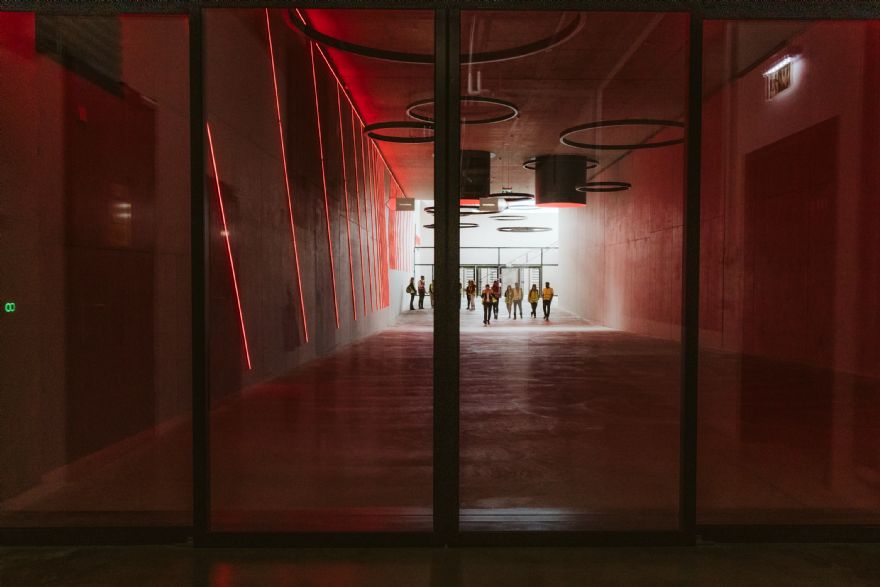 A factory built for the future — the imposing entrance to Ceratizit’s new Kreckelmoos facility in AustriaCeratizit
A factory built for the future — the imposing entrance to Ceratizit’s new Kreckelmoos facility in AustriaCeratizit recently held its first Open Days for the trade press since 2019 and a lot has changed in the intervening years as
Machinery Market’s John Hunter discovered. Brexit, the Covid-19 pandemic and supply chain challenges have all hit the manufacturing industry hard, but one thing which was immediately apparent to all those in attendance — the ambition of one of the world’s leading producers of hard material solutions and cutting tools, has not diminished.
In fact, the company is aiming to become the third largest producer of tungsten-carbide tools, and to rapidly reach this goal has made a number of strategic acquisitions in recent times, including the purchase last year of California-based Xceliron Corp, a round tool manufacturer focused on providing special solid carbide tools for aerospace and automotive industries in the USA, and Changzhou CW Toolmaker Inc, a privately-owned company based in China that specialises in the design, production and sales of tungsten-carbide cutting tools for the electronics industry, and a number of other industrial sectors including aviation, railway, and mould and die.
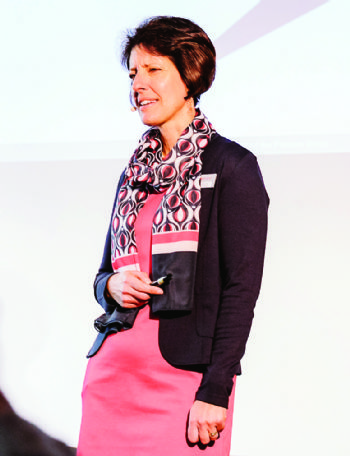
There have also been senior management changes at Ceratizit, which since the retirement of Thierry Wolter last year, is now 100% owned by the Plansee Group. The executive board consists of three members, Melissa Albeck (pictured right), Andreas Lackner and Frank Thomé. As part of an ongoing integration of the Plansee Group, the three Executive Board Members have taken on extra responsibilities. Andreas Lackner is now not only responsible for production in all Ceratizit divisions, as a member of the Executive Board of the Plansee Group, he is also heading up the core topic of sustainability.
Melissa Albeck is now responsible for the sales of cutting tools, which was previously the remit of Thierry Wolter, and she is also responsible for the Americas region. The Executive Board is completed by Frank Thomé whose responsibilities include sales for the Hard Material Solutions and Global Tungsten and Powders divisions as well as the company’s Asian business, including CB-Ceratizit, a joint venture formed in 2010 by Ceratizit and CB Carbide, a Taiwanese manufacturer of tungsten-carbide tools.
This new management structure gives Ms Albeck and Mr Thomé key roles in the company. To grow faster than the market and to become the third largest player in the carbide industry, Ceratizit is focused on further growth in Asia and on the American continent in the coming years. Ms Albeck said: “We have learnt in the past couple of years, following the Covid-19 pandemic and supply chain disruptions, that having a global footprint isn’t enough, we need to be sure we can also support customers locally. We have many production plants in Europe but we also have powder production in China as part of CB-Ceratizit and powder production and a main chemicals facility in the USA — so we are able to make tungsten powder on three continents.”
Pioneers of advanced carbide productsThe Ceratizit Group was originally formed in 2002 by the merging of Luxembourg-based Cerametal and Austria-based Plansee Tizit; both had been established for almost a century and were pioneers of advanced carbide products. Ms Albeck said: “Ceratizit has grown significantly since 2002, both organically and through mergers and acquisitions. Among these are WNT which has been part of Plansee Tizit since 1987, while Klenk was acquired in 2015, Komet and US-based Best Carbide in 2017.
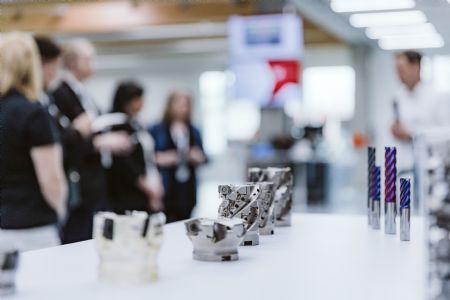
“An unusual purchase that is unique to the Ceratizit Group but one that is a huge advantage, was the purchase of Stadler Metalle a German metal scrap dealer in 2019. This has enabled us to have our own internal source of scrap, which will prove to be very important for sustainability and an important source of recyclable material for the future.
“Furthermore, GTP, Ceratizit’s powders division which makes tungsten powder for the Group was transferred from the main Plansee Group in 2021 and in 2022 a French company called Agricarb that makes carbide tips on steel ploughs was acquired — a completely different application for carbide.”
Reutte in Austria is one of the main global manufacturing hubs for Ceratizit— it was chosen in 1921 by Plansee’s founder Paul Schwarzkopf to site his first factory to produce tungsten wire for lamps as it was close to a hydropower station — the most reliable source of electricity at the time.
The press tour to the Reutte factory included a series of ‘interactive market places’ which involved presentations and discussions on sustainability, innovation and how Ceratizit is using additive manufacturing techniques to produce 3-D printed tools using cemented carbide grades. This was followed by live tooling demonstrations in the Reutte Innovation Center on a Mazak MTV 815/80 vertical machining centre and a DMG CTX Gamma 1250 TC turning centre.
The Mazak was used to demonstrate milling techniques, firstly profile milling using a Maximill extended flute cutter; slot and shoulder milling with a MaxiMill 211-15 shell mill; and helical and inner contour milling using a MaxiMill 211-11KN shell end mill shank. The DMG turning centre demonstrated turning techniques, including high dynamic turning with FreeTurn, turning with EcoCut, turning using an ISO-insert, slot milling with a MaxiMill Slot SX and hard turning with a PCBN insert.
KreckelmoosDemonstrating its long-term commitment to Reutte, the company recently opened a new production facility called Kreckelmoos which it describes as a ‘sustainable expansion of Ceratizit in Austria’. The construction of the energy-efficient production buildings — the size of two football fields — supports the Plansee Group’s mission to reduce the company’s carbon footprint (CCF) in a sustainable way. The ‘state of the art’ 45,000m
2 building comprises production halls, storage and logistics areas, offices and social rooms for over 300 employees.
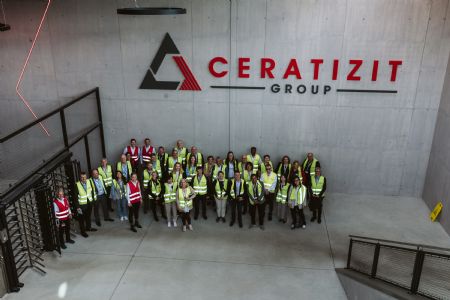 Pictured right: The press tour at the entrance to the award-winning Kreckelmoos factory
Pictured right: The press tour at the entrance to the award-winning Kreckelmoos factory“Simon Jost, managing director of Ceratizit Austria, said: “The construction of our new Kreckelmoos site, 1km away from our main Reutte site, opens up new opportunities for growth, automation and digitalisation in the manufacturing of our products.”
Sustainable buildings like Kreckelmoos, which won a prestigious German Design Award 2024 for its ‘excellent architecture’, reduce the Product Carbon Footprint (PCF) of Ceratizit products. Ceratizit is the first company in the industry to produce a model for calculating and classifying the PCF of its carbide products. While it was initially developed for Plansee and Ceratizit to drive their own efforts to achieve ‘net zero’ operations, Ceratizit wants to encourage customers, partners, and other companies to adopt the newly developed standard so that there is more transparency within the industry and customers can make more informed sustainability choices.
For Ceratizit, the calculation of the PCF includes all processes from the extraction of the raw materials, the production of the semi-finished products/blanks and the finished product, and the transport of the raw materials and intermediate products up to the point where the product leaves the company — cradle-to-gate. In this way, Plansee continues to strengthen its position as an innovation and development partner for its customers in this area, and Ceratizit moves closer to its goal of being an industry leader in sustainability.
Ms Albeck said: “Ceratizit set out a couple of years ago to establish itself as the leader in sustainability in the carbide industry. It is a topic that is important to us personally, to the new generation that is coming in to work with us, and we just believe it is important to be careful with the resources we have in this world and to do our part to protect the planet and be responsible. We set ourselves an ambitious goal to becoming carbon neutral by 2025 by reducing the need for virgin raw materials and to use scrap carbide in circular processes in our production is very important.”
LogisticsThe second day of the press Open Days focused on Ceratizit’s facilities in Kempten, Germany, where the company opened a ‘state of the art’ logistics centre in 2021 and where it has also just opened a new technical centre — the press contingent were in fact the first official visitors.
The Kempten logistics facility is one of the most modern in the industry worldwide and in terms of energy efficiency, was designed to meet the highest standards — its energy demand is almost exclusively met by solar energy. Kempten is the central distribution centre for all the European production sites with 90,000 products available for next-day delivery — and there is no minimum order quantity. Ceratizit offers a comprehensive range of tools, everything for machining, from the spindle to the machine table. Furthermore, special tools can be delivered within three weeks.
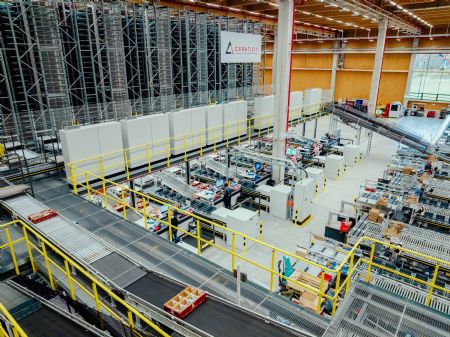 Pictured right: the Kempton logistics centre which is the central hub for all the European production sites
Pictured right: the Kempton logistics centre which is the central hub for all the European production sitesThere is an average of 12,000 picks a day, and 4,000 orders sent out to 80,000 customers spanning 74 countries worldwide, with an average order costing 500 euros. A press tour in 2019 of the old logistics facility, which was sited nearby, saw people working in shifts on a variety of manual tasks. Much of this has now been replaced by automation and the new facility currently requires only 65% of the floor area in the new building, so there is still much scope for expansion.
Meanwhile, plans for a ‘state of the art’ Kempten Technical Center were first mooted around two and a half years ago. The impressive new purpose-built facility features a 725m
2 machining area for demonstrations alongside 5,000m
2 of modern offices and open space which houses the sales teams for Germany, Switzerland and Austria, as well as the company’s marketing teams.
The new technical centre will be used to train Ceratizit employees on new tooling solutions and for customers to test tools or watch tests carried out on defined components and specified materials. Ceratizit now has nine technical centres worldwide, including one in Sheffield and plans are currently being finalised to enable them all to network with each other and exchange ideas and process data.
The press tour was completed with live demonstrations on a DMG DMC 90 U five-axis machining centre in the brand-new technical centre of deep hole drilling, trochoidal and universal milling, process monitoring, including wear detection, adaptive feed control and collision detection. There were also demonstrations on a DMG DMV 115 vertical machining centre with R-C2 automation with Ceratizit solutions for milling drilling, reaming and fine boring put to the test.
Success in the UKThe Ceratizit Group is represented in the UK & Ireland by Sheffield-based Ceratizit UK & Ireland Ltd, which is now the number one cutting tools supplier in the UK & Ireland; no particular sector dominates the company, which has a very strong presence in the aerospace and defence, automotive, oils and gas, medical and motorsport sectors — including Formula One.
 Pictured right: Ceratizit UK and Ireland recently held an Open Day at its technical centre in Sheffield
Pictured right: Ceratizit UK and Ireland recently held an Open Day at its technical centre in SheffieldTony Pennington, managing director of Ceratizit UK & Ireland, said: “From a start-up in 1999, with zero turnover and zero customers, the team in the UK has done a great job in building very strong and long-standing customer relationships which are based on high-level technical support, the best logistical solutions, customer service and above all else — trust.
“Going forward we are taking this customer support model to another level with a new purpose-built headquarters in Sheffield in 2026, which will bring together, under one roof, our three current sites with a significantly enlarged technical centre providing increased capacity for our engineers to work with customers on their application and process optimisation projects, training needs and bespoke ‘Made in Sheffield’ workholding solutions.”
He concluded: “Also supporting customers with their own sustainability targets, our new headquarters will include an enlarged recycling facility, and Ceratizit customers who use the 500-plus vending machines in the UK and Ireland as part of our Toolsupply service, will be able to access the service to recycle their scrap. This will be collected by us on our regular replenishment visits, without adding any extra miles, and they will also receive a 10% premium on the general market scrap rate. We will then use this scrap in our established recycling processes to increase the share of raw materials remaining in the carbide production chain to over 95% by 2030, based on scrap recycling rates of sintered products.”